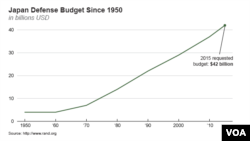Japan announced Wednesday that its defense budget for the coming year will rise to almost $42 billion which will be used to push ahead with controversial changes to Japan’s military that have already caused anger in Beijing.
Japanese defense forces have been conducting military exercises designed to simulate amphibious assaults and invasions.
The nation's record defense budget will go towards new amphibious vehicles, surveillance aircraft and F-35 stealth fighters. The investment is intended to counter the changing security threats of the region, says Alessio Patalano of the Department of War Studies at King's College London.
“Both in terms of North Korea’s missile and nuclear brinkmanship, as well as Chinese moves, there is a growing sense of tension in East Asia. For Japan, that means primarily guaranteeing a better conventional defense potential for the offshore islands of the southwestern part of the archipelago,” says Patalano.
Japan and China dispute the ownership of islands in the East China Sea, known as Senkaku in Japanese and Diaoyu in Chinese. The islands are controlled by Tokyo, but Chinese military vessels and aircraft have repeatedly entered the area. The dispute is about more than it appears on a map, says Jonathan Fenby, China analyst and former editor of the South China Morning Post.
“This is, in a sense, ridiculous to have this argument over a few uninhabited scraps of islands off the Japanese coast. But it stands for a much bigger rivalry in East Asia, where China wants to assert itself; it wants its regional position to be recognized,” says Fenby.
Push for bigger profile
Japan’s defense spending, part of an $814 billion total annual budget, is part of Prime Minister Shinzo Abe’s push to build a more active military. After his re-election last month, Abe said he had a mandate to strengthen Japan’s defense forces.
He said he pledges to keep engaging in global diplomacy, keep defending national interests and protecting the lives of citizens, and to make sure they live a happy life.
Abe has vowed to change Japan’s pacifist constitution to normalize the armed forces. China has warned him to "tread carefully" and accuses Japan of failing to atone for past military crimes.
Last month, China held a first-ever day of remembrance to honor the victims of the Japanese military rampage in Nanking in 1937. Beijing says 300,000 people were killed.
The long-running rivalry between them is likely to continue, says Fenby.
“I think this is one of those disputes where neither side actually wants a solution because it serves domestic nationalist positioning, so long as it doesn’t get out of hand,” says Fenby.
The United States has made clear its support for Japan’s territorial integrity. Japan’s increased defense spending does not reduce the importance of the U.S.-Japan alliance, says Alessio Patalano.
“Actually, it’s quite the opposite. It’s to make it more operationally viable to increase the ability and the inter-operability with the U.S. military at one level, but also to allow Japan to be a political partner that is not just a junior member of this relationship,” says he.
Patalano says an enhanced defense relationship with Japan is at the heart of the United States’ so-called strategic pivot to Asia - and the increased spending will likely be welcomed in Washington.
Japan's military spending is still dwarfed by China's, whose military budget at $132 billion last year is second only to that of the United States.






